The Day River flows gently around the tranquil village, and the gentle pace of local rural life seems to run much as usual, as if there has been no pandemic sweeping through.
People work busily every day in artisan Phan Thi Thuan’s workshop. Some collect mulberry leaves to feed silkworms, while others work attentively at the weaving machines.
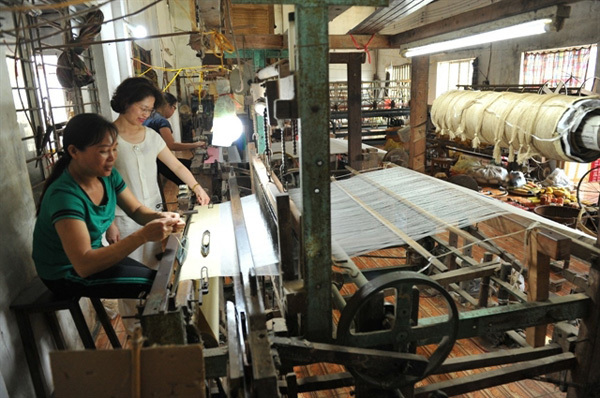 |
| Do Thi Loan (sitting) works by a weaving frame at Thuan's workshop. Photo courtesy of Phan Thi Thuan |
From time to time, Thuan checks the sheet spun from silk by thousands of worms on the floor.
She smiles at the thicker and thicker silk sheet as it is 'weaved' by the hard-working worms.
“Though I have been bogged down with lots of difficulties in sending my products to customers due to the pandemic, I have tried my best to maintain production and created jobs for locals as before,” Thuan told Việt Nam News.
The best season for the mulberry plant to grow is between March and November, and this abundant material is used to feed the silkworms. Hence, silk production runs as normal.
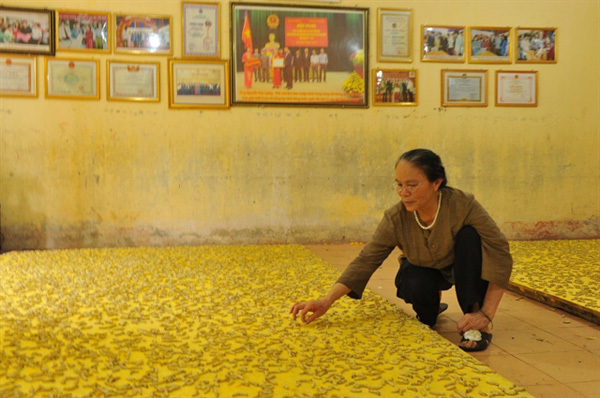 |
| Thuan checks the 'flat cocoon' spun by thousands of silkworms. Photo courtesy of Phan Thi Thuan |
Thuan said that her sales had reduced by 70 per cent of that in the period before the pandemic. She has used her savings and got loans from her relatives to ensure she can maintain production.
“We are lucky not to have the pandemic spread here, so we can still work in safety,” she said. “My workers work as usual so I still pay them as usual. When the pandemic is over, we should have products available for customers. That’s the reason why we still keep things going.”
Thuan said her My Duc Silkworm Co Ltd gathers 20 workers at two workshops in the village and some 150 people working at home in the area and other provinces like Nghe An.
Each worker at the workshops earns VND6-7.5 million (US$260-300) per month, while a 'satellite' worker may earn VND5 million.
Every month, her company produces 1,000m of silk and 500kg of cotton.
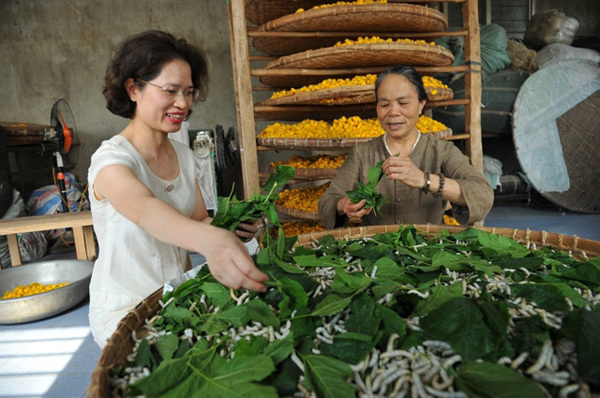 |
| Thuan (right) feeds the silkworms. Photo courtesy of Phan Thi Thuan |
Before the pandemic, she sold out everything she produced while during recent social distancing and lockdown periods she has found it hard to reach customers and send goods to the cities.
Thuan’s customers are spread throughout the country from Hai Phong, Thai Binh and Nam Dinh to HCM City and Gia Lai. Most of her goods are sent by land and air.
Since the outbreak of the pandemic in the country in April last year, Thuan has adopted a new product: three-layer silk masks.
“Worms are especially sensitive to chemicals,” she said. “They live in a fresh natural environment, otherwise they will die.”
Her mask is made with three silk layers. The inner most layer is made from smooth silk, the middle layer is made of flat cocoon material that the worms spun over ten hours. The outer layer is a rougher silk sheet.
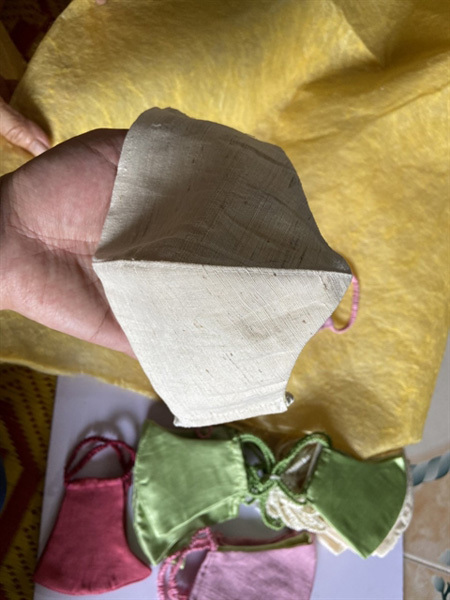 |
| A mask made of silk by the company. Photo courtesy of Phan Thi Thuan |
“Masks not only protect people from dust or the virus, but also nurture the skin, absorb sweat and bring pleasure to the wearer,” she said.
She said that while other products like silk blankets and fashion accessories have sold slowly during the pandemic, her silk masks have sold well.
Each month, the company produces around 5,000 silk masks.
Silk cotton facial towels are another key product of the company during this period.
Thuan said three popular products of the company are waiting for official five-star [the highest of its kind] certification for the national OCOP (One Commune One Product) programme. They include silk scarves made from lotus stems, silk scarves made by silkworms and blankets made from flat-formed cocoon material also from silkworms. The products already have four-star certificates.
Stable jobs
Truong Anh Tuan, head of the Economic Department of the My Duc District’s People’s Committee, said he appreciated the efforts of the company amid the pandemic.
“Thanks to a convenient form and friendly-to-user material, silk masks from the company have sold very well creating stable jobs for locals,” he said.
He said the authorities would explore more potential products and assist local enterprises to join the OCOP system to ensure quality as well as create more jobs.
The district makes other traditional OCOP products like Huong Tich Apricot Wine, cake from yams in Huong Son Commune, and cotton towels in Phung Xa Commune.
Do Thi Loan, a worker in Thuan’s company, feels happy and content to have a stable job.
“Though the pandemic has not reached our village, it has affected jobs of many people here,” she said.
Her husband, a freelance weaver for various companies in the commune, has had no job for a year.
“I still work as usual in Thuan’s workshop and receive a normal salary,” she said. “I know I’m luckier than many people here to have strength and a stable job.”
Loan said one of her sons, a worker at a local aluminium factory, has also been unemployed for many months.
Loan has been working in Thuan’s company for three years, doing hand loom weaving. She earns VND7 million per month. Her husband gets VND10 million each month in normal periods.
“We all hope the pandemic will be under control soon to have stable jobs and income,” she said.
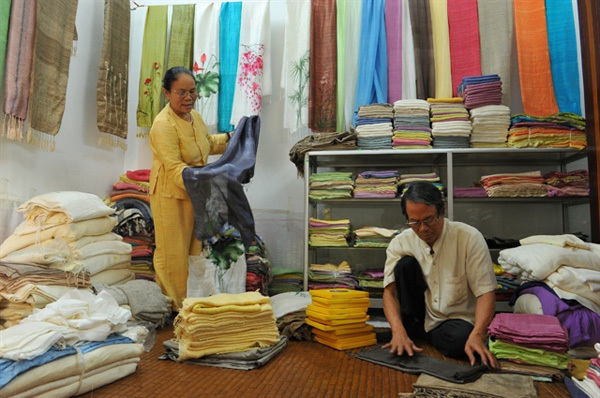 |
| Thuan runs her workshops as usual despite the pandemic. Photo courtesy of Phan Thi Thuan |
Thuan is a pioneer in weaving silk from lotus stem fibre in the north. Her scarves made from lotus silk have been chosen as a handmade gift presented by national leaders to guests at various international events.
Pandemic or not, Ha Village will continue to quietly go about its business making top-quality artisanal silk.
Source: Vietnam News
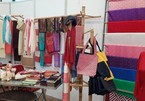
Silk weaving in Vietnamese life
Silk weaving has been a traditional handicraft in Vietnam for thousands of years. Legend has it that the craft was introduced to Co Do village in Hanoi’s outlying district of Ba Vi by the sixth Hung King’s daughter, Princess Thieu Hoa.
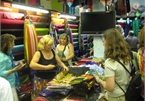
Visiting Hanoi’s Van Phuc - oldest silk village in Vietnam
Van Phuc silk village is renowned for its traditional silk trade and high quality products, making it one of the most visited craft villages in Vietnam.